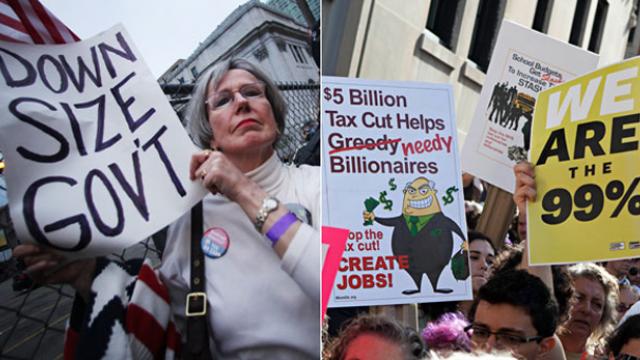
George Mason University's Mercatus Center has begun a project to better understand and report on the consequences of corporatism and cronyism. The research promises to speak to one of the main concerns of both the Occupy Wall Street and Tea Party movements: government favoritism for the privileged.
In a Wednesday interview with The Christian Post, Matthew Mitchell, senior research fellow at Mercatus, explained that Mercatus has been doing research on cronyism since the 1980s, but decided to place a more overt emphasis on the issue about six months ago for two main reasons.
First, Mercatus scholars noticed that even though the Occupy Wall Street and Tea Party movements represent polar opposites on the political spectrum, they both express concerns about cronyism and they both opposed the bank bailouts that followed the 2008 economic crisis.
"To the Tea Partiers, these bailouts were an unwarranted federal intrusion into the free market; to the Occupiers, they were a taxpayer-financed gift to the wealthy executives whose malfeasance brought on the financial crisis. To both, the bailouts smacked of cronyism," wrote Mitchell for a research paper on cronyism called "The Pathology of Privilege: The Economic Consequences of Government Favoritism".
Second, Mitchell has observed an increase in the number government privileges going to businesses at all levels -- federal, state and local -- of government. Mitchell and other Mercatus scholars are also working on codifying and documenting cronyism to test whether his personal observations are correct regarding the increase in cronyism.
Mitchell's research paper explains nine different types of privileges that government can give to businesses, such as bailouts, tax deductions and subsidies, but he notes that his list is not exhaustive -- there are many ways that government can favor one business, business sectors or type of business, over others. The Mercatus website has an infographic depicting each of these government privileges.
While the Tea Party movement is concerned about too much power in the hands of government and bureaucrats, and the Occupy movement is concerned about too much power in the hands of the wealthy and big business, Mercatus' research points to where those two concerns overlap. Cronyism, Mitchell explains, benefits the wealthy and big business to the detriment of the poor, middle class and small businesses.
Cronyism "slows growth, it misdirects resources, and it, interestingly, doesn't just misdirect them in a way that makes us all poorer, but it seems to benefit the wealthy and well-connected at the expense of the poor and unknown, or less wealthy and less well known," Mitchell said.
There are social consequences to cronyism as well, Mitchell points out. In his paper, he cites research demonstrating that greater cronyism leads to greater distrust of social institutions and lower levels of belief in the idea that hard work will be rewarded.
Mercatus is working on broadening its audience beyond academia. It has produced, for instance, shorter essays and videos, and its scholars are sometimes interviewed on radio and television. Mitchell mentioned that he had five radio interviews just the day before his CP interview.
Mercatus' sister organization, the Institute for Humane Studies, has produced a video called "How Cronyism is Hurting the Economy". Narrated by Jason Brennan, professor of philosophy at Georgetown University, the video makes many of the same points discussed in Mitchell's research.
While Mercatus is a university-affiliated institution and takes no official political stance, Mitchell acknowledged that he and many of his colleagues hold a libertarian view of government. George Mason University's economics department specializes in a method of research known as "public choice," which applies tools of economics to study politics. Mitchell believes that the bulk of research in this area lends itself to a skeptical view government that is consistent with a libertarian philosophy.
3 WAYS TO SHOW YOUR SUPPORT
- Log in to post comments














